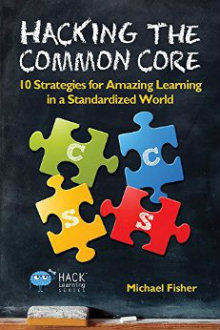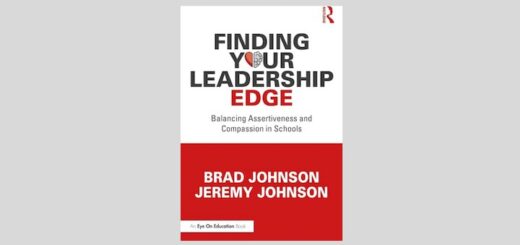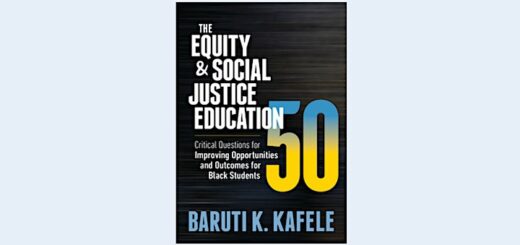10 Strategies Help You Hack the Common Core
Hacking the Common Core: 10 Strategies for Amazing Learning in a Standardized World
By Michael Fisher
(Times 10 Publications, 2016 – Learn more)

Oh “hack” yes!
Hacking the Common Core is the book many teachers have been waiting for. It’s a no-nonsense guide to the intent of the CCSS. In this short but powerful text, author and education guru Michael Fisher shares ten easy-to-read chapters that get at the heart and soul of what the state standards are while leaving the politics surrounding them trailing in the dust.

Each hack will be explored below, but first, take a look at the powerful main messages that connect them.
Main Messages:
- The CCSS are basically good for teachers and students. Fisher points out that not only are they not so different than what most states had before, but they are also better articulated by grade and have a new emphasis on deep thinking and problem-solving. A one-word summary of the standards, says Fisher, is thinking.
- Instead of getting caught up in the minutia of the standards, teachers should think about them in terms of intent and in clusters or big ideas.
- Programs and programmatic teaching will not be a cure to any of the real or perceived problems in our schools. Teachers must be allowed to teach with heart and creativity. Differentiated instruction must trump standardized teaching. And we cannot allow the CCSS to be a death knell for FUN in the day-to-day business of teaching and learning.
- Teachers are professionals – Fisher clearly respects educators, but he doesn’t hold back from hard truths, either. He reminds readers repeatedly that students must come first. Before the curriculum and before the needs of the teacher.
The Set Up
Each chapter is presented in an very practical structure common to all of the Hack Learning books (there are five in the series and more on the way.)
- The Problem: A current “problem” or hot topic in education is shared.
- The Hack: A hack, or new way to view the issue, is suggested.
- What You Can Do Tomorrow: A plan for immediate implementation is offered.
- A Blueprint for Full Implementation: A plan for a systemic approach to implementing the hack as a long-term solution is outlined.
- Overcoming Pushback: A look at common problems teachers and schools might have with the hack.
- The Hack in Action: A short case-study detailing the hack being implemented in a real school.
The “Hacks”
Although the book touches on math (and much of the content could easily be applied to math), the hacks tend to speak mostly to English language arts and disciplinary literacy.
- Shift Happens. Fisher starts strong by focusing in on the first main idea shared above. If teachers are to be successful with the CCSS they must stop picking at the minutia and start thinking about broad ideas and the “instructional shifts” inherent in the standards.
- Close in on Close Reading. Close reading has been one of the most tragically misunderstood offspring of the CCSS. Fisher brings reason back to the practice, reminding teachers that close reading is a strategy, not a curriculum, and that it should be used sparingly. Similarly, he boils close reading down to the idea that students must read carefully, be able to talk about texts, and use textual evidence to support their thinking. Who needs a store-bought program to do that?
- Friday Every Day. Here Fisher helps teachers to take a look at our Friday practices, including assessments and the fun stuff. He helps the reader problem-solve methods for moving both out into the rest of the week because assessment should be ongoing and school should be fun! He asks, “How can we bring the delightfulness of Friday to every day?” (p. 42).
- Morecabulary. This chapter calls on the teacher to use tried and true best practices in vocabulary development.
- Embrace the Novel. Fisher explodes the myth that the CCSS call for the demise of teaching fiction. He insists that every teacher is responsible for teaching reading and that much of the shift towards nonfiction reading can and should happen in discipline-specific classrooms.
- Prioritize. This chapter focuses on helping the reader see the CCSS as big ideas rather than what can feel like thousands of separate to-do lists for teachers. Fisher asks teachers to look at learning progressions for each standard across grades and to begin to group and prioritize the standards in teams or PLCs.
- Vigor Versus Rigor. For anyone who, like me, has come to hate the word “rigor” this is a hack you will love! Instead of “rigor,” Fisher suggests, use the word “vigor,” which connotes hard work and deep thinking rather than rigidity.
- Upgrade the Verb. Again, this hack asks teachers to look at learning progressions and to have at the heart of their teaching a drive to help each student “level-up.” This means teachers across grades and content must be informed about each other’s learning targets. We must begin to think systemically about a student’s school career, not just about what happens in our class, our grade, or even our school.
- One Size Fits None. The idea that all students can or even should be at the same level at an arbitrary point in any given year just doesn’t fit with reality. In this hack, Fisher helps teachers think about how to help each student make a year’s worth of growth in a year’s time with vigorous but not overly frustrating learning challenges for all.
- Involve Parents. If we want the CCSS to make a difference in the lives of our students, we have to get their parents on board. This means sharing information and reaching out to answer questions and clarify confusions.
This book is a great read and really helped me “hack” my own thinking. If you are a teacher who is in a standards-based system, you will find tips, hints and tricks in this book that help you clarify your thinking and thus better serve your students.
Rita Platt (@ritaplatt) is a National Board Certified teacher with master’s degrees in reading, library, and leadership. Her experience includes teaching learners in remote Alaskan villages, inner cities, and rural communities. She currently is a teacher-librarian, teaches graduate courses for the Professional Development Institute, and writes for We Teach We Learn.



































